- Home
- A. A. Attanasio
Wyvern Page 2
Wyvern Read online
Page 2
Inspired by Malawangkuchingang's tales of the wider world, Batuh believed himself more worthy of leadership among the Tree Haunters than the traditional elders. He declared his peerage by daring to hunt the royal pigs — and the elders exiled him for his arrogance. Intrepidly, he headed south toward where the drum songs of other Shadow Tribes spoke of sighting the big ships and their brightly garbed men with red, big-nosed faces.
At the end of his first night of exile, Batuh met a sorcerer named Jabalwan, a mansnake in knotted loinskin and viper sinew armbands. "Go back," Jabalwan warned, pointing a needlebone at Batuh. "The way ahead belongs to the dead." For the first time in his life, Batuh had been truly afraid. The mansnake was smoke thin, emaciated from a lifetime of fasts and trances. His body, naked except for loincloth and snakeskin armbands, wore many scars from ritual incisions. His legs displayed tattoos of twin serpents, caught in a dance across his flesh. Others would have scurried back. Batuh slipped sideways into the dark jungle and rushed past the sorcerer. He became the hawk's shadow, the wind's gossip, a spark. "It is forbidden" was the last he had heard from his tribe.
*
In the third moon of his exile, Batuh found the gods he sought. He had defied the mansnake, trespassed the dead, endured the greed of the swamp, and evaded the fierce Muslim tribes of the coast to reach the Dutch trading factory of Bandjermasin. Mazed with streams and silver canals, a garden village sprawled prosperously, with many fern-roofed longhouses raised on stilts. At the south end, where converging rivers flowing through the village spilled into the sea, giant bamboo walls enclosed the trading post. Enormous trees had been lashed together among the mangrove islets to create a wharf, a giant spiderwork of scaffolding and winches among log platforms loaded with bales, barrels, and crates. Elephants carried cargo from the walled factory to the wharf and small boats conveyed the lading out to the deepwater bay where big ships waited. For one day, these bearded, red-faced men truly moved as gods in Batuh's eyes, their village the commerce of heaven. The finery of their clothing, the size of their ships, and the eeriness of their sky-colored eyes bespoke kinship with spirits.
The people of the village told him the truth about the monkeyfaced men. And soon enough he beheld them drunk and brawling. He witnessed a ruddy sailor slain, his skull clubbed open and brains spilled like a shucked sea creature. These were men, just as Malawangkuchingang had told him, only their hunger burned fiercer and made them stronger than most men. He felt ashamed that he had ever thought them gods, these loud, ugly men. Yet they constituted a powerful tribe. Thunder smoked from their ships, Dutch glass cut sunlight into stars that raised flames from leaf tinder, and the metal of their blades cut keener than the best knives that the Muslims traded the Tree Haunters for skins.
Batuh decided to work among the bearded foreigners in the trading factory, with the secret hope of luring them back with him to the kingdom of the blue butterfly, where their power would win him supremacy and their golden heads adorn his longhouse. He made no money cleaning boots and fetching water for the commonest of the sailors, yet he learned some Dutch and cadged food. Within a year, he was telling tall stories of his village to the sailors, baiting them with tales of what they most wanted to find — diamonds big as betel nuts in the river silt. Pieter Gefjon alone of the captains took him seriously.
*
The war cries of the pirates jarred Batuh loose from his memories. Dutch soldiers stood at the rails on all sides of the ship, matchlocks propped on aiming forks, fuse coils smoking. Cannon boomed, knocking Zeerover to one side. Batuh pulled himself to his feet to watch.
The cannon shot had splashed harmlessly among the spry djong, and the pirates swooped closer, waving swords and taking aim with their bows. The severe, sun-blackened faces gleaming with sweat looked like dark beetles ready to burst into flight. The Dutchmen fired their matchlocks as the Lanun archers released their shafts. Batuh swung to the deck, and an arrow whistled through his shadow.
Grapnel hooks crashed over the rail, and crewmen converged to cut them away. An arrow struck one of them through the eye and threw him to the deck at Batuh's feet, where he laid writhing and wailing. The aborigine crouched over the screaming man, who with one hand gripped the lethal arrow piercing his eye and with the other tried desperately to free an amulet he wore about his neck. Batuh tugged the iron talisman free of the sailor's shirt, a cross with a tiny man nailed to it. The wounded crewman kissed it and stiffened.
Batuh pocketed the dead man's amulet, taking the man's life strength for his own, and tried to stand to join the fight. Nausea stymied him, and he fell back and retched bile over his Dutch clothes. When he looked up, the grapnel lines had been cut away and the crew cheered, boisterously routing the pirates.
Captain Gefjon had taken out his Bible and beat it against his chest while he shouted orders. "Ready cannon to catch them as they flee," he hollered. An arrow stabbed his side, throwing him against the quarterdeck skylight.
Batuh reached Gefjon first. He placed the Bible near the captain's hands so he would have something to grip. Then he took the shaft in his blunt fingers and felt through the blood-soaked cloth to where the arrow had cut between the captain's ribs. Relief rose in him as he felt the barbed head snagged on the bones. It had not pierced any organs. If the poison was not too strong, the captain might yet live.
Gruff hands seized the aborigine and heaved him aside. Batuh huddled against the gunwale and watched the sailors crowd about their captain and finally carry him off to his cabin. From the pocket of his oversized doublet, the tribesman removed the black silver cross with the image of a man in great agony nailed to it. This was the monkeyfaces' strongest god, since they all swore by him, calling his name in times of fear as well as disgust. This was the god of the captain's black book, the very god that Gefjon had spoken of so often. Batuh turned the silver cross in the fingers of one hand, feeling the shape of the tortured body, the shape of pain that these devils worshiped. With this amulet, he too could talk with the pain god. He prayed that the captain would live and that Zeerover would not turn back to Bandjermasin but proceed, unhampered by pirates, to the Eater of Men.
The amulet felt powerful in Batuh's hands, and he believed his prayer had been received. He believed, too, that when the time came for him to take the Dutchmen's golden heads, to assure more abundant life in the land of the Tree Haunters, this god, whom the captain fervently assured him was a god of forgiveness, would forgive him.
*
Under the scarlet evening, Jaki entered the clearing where he lived. Mala's silhouette waited for him in the doorway of their stilt-raised hut. Whispers of twigsmoke and simmering broth wafted on the cool wind, and the boy ignored his fatigue and quickly climbed the notched log to the verandah.
"You have disobeyed me, little man." His mother's unhappy voice stopped him in her shadow. She smelled of firewood, and her slender shape bowed over him, weary with concern.
"Is there meat tonight?" he asked cheerfully, to no avail.
"Thrice I have forbidden you to leave our valley," Mala remonstrated, her fingers searching through his hair for burrs, insects, and spiders. "Thrice you have disobeyed me. What am I — " She stopped when she felt the blood-caked knot at the side of her boy's head. He flinched, and she stood aside so that the wan light from the hut illuminated the welt. "How did this happen, Jaki?"
Before he could answer, she hurried him inside and sat him by the cooking fire where a savory broth boiled in an iron pot and a coil of snakemeat crisped on a spit. While his mother cleansed his wound with a wad of moss soaked in nut oil, Jaki told of his encounter with the Rain Wanderer children. "Why do they call me demon-child?" he asked. Her calm eyes, set deep as the black shine in a jungle pool, answered the hurt in him without her speaking a word.
When he pressed again, she replied, "Your father is different from the fathers of the forest. The children of the tribes do not understand. To them, a demon is anyone who does not look as they do. They are ignorant. They were ignorant wit
h me when I was a child. My father, too, came from a distant land ..."
Into bowls carved from root burls, she ladled the soup and diced the snakemeat into it. They ate together. She told him the old stories of his father and the pirates who had killed him, of her father and the big ship that brought him and the fever that had carried him away. Afterward, she took out Pieter Gefjon's Bible and by moonlight read to him about the apocalypse from the Book of Daniel. When he lay down on his grass mat to sleep, his mind whirled with images of kings stern-faced as cliffs and nations warring like red and black ants jamming a carcass. The frown that had shadowed his childface since Ferang had raised a stone to him relaxed, and what set him apart no longer troubled him.
Mala watched until his eyelids fluttered at a dream's verge. This was the third time recently that she had been left alone all day by her son, and she knew that signaled a lonely change — an ending that she had feared from the day Jaki was born. At seven, boys in the forest tribes left their mothers, taken by their fathers' brothers to be circumcised. She knew that Jaki’s destiny would take him elsewhere.
She lit a string of waxfern to ward off mosquitoes and stepped out onto the verandah. Clusters of stars flitted like mist among the moonstruck clouds, and swarms of fireflies flashed in the black doors of the jungle. The night breathed light. Distantly, Rain Wanderer drum songs rippled in the wind. She did not understand them. A woman from the north coast, a fisherwoman's daughter, she had been kidnapped by the forest people nine years before as a child. She did not understand most of what had happened to her since. Her faith in her father's God had helped her to endure her solitude and ignorance while she mothered Jaki.
Moonshadows crossed the clearing wearily: the shades of her past. Though she had never seen him in life, she recognized her father, the one pale stranger among the dark wraiths of her tribe. The fisherfolk and her father vanished in moonsmoke, gone as soon as she stared hard enough to see if they were really there.
Alone with her son, she faced the night as she had these seven years. Nothing had changed. The wind turned and carried out of the forest the perfume of night-blooming jasmine and a chill from the mountains.
*
Pieter Gefjon did not die. Though a ferocious pain invaded his body and fever wracked him, his greed for diamonds would not be thwarted. He ordered Zeerover to continue along the unknown coast.
Strapped to a cot and clutching his Bible to ward off the demon visions of his fever, Gefjon could no longer oversee the expedition. Command devolved to Jan van Noot, an agent of the ship's owner, the Dutch East India Company. A tall, handsome man with white-gold hair, van Noot differed from the others: clean-shaven and always meticulously dressed in the latest finery of The Hague. He wore silk breeches, pearl-studded jerkin, white high-heeled boots with red soles, lace cuffs, lace collar, lace at the knees, lace on the brim of his black velvet hat, and lace-fringed gloves scented with frangipani.
Command of Zeerover had no appeal for van Noot, and he was content to leave all nautical decisions to the pilot while he contemplated the fortune in raw materials that awaited them on the Mahakam. An aristocratic debaucher pressed by family obligations to serve the company, van Noot's greatest strength had always been his indomitable lust. Presently, he found himself off Borneo fleeing the wrath of a powerful merchant in Amsterdam whose wife and daughter he had seduced. The merchant had arranged, through his considerable influence in the company, to assign van Noot to the most parlous venture available.
Danger did not daunt van Noot so long as he had a cabin in which to hide and other men to do the fighting. Denied an outlet for his rapacious sexuality, he invested all of himself in his ambition to return to Europe a rich man.
*
Batuh declared his victory among the deities in the south by chanting loudly into the jungle, requesting fresh water at each stop along the coast. When Zeerover reached the Eater of Men, drum songs had already announced Batuh's return to the Shadow Tribes of the interior. Numerous clans, including the Tree Haunters, converged at the mouth of the Mahakam to witness his glorious homecoming.
Natives with red-streaked faces hopped and jumped to brattling drum music in welcome of the returning exile and the gods who accompanied him. In a fervent display of greeting, men and women, bodies glossed with nut oil, coupled in the sand. Others pierced their cheeks with long palm needles and danced quill-faced in tranced circles. The Dutchmen, splashing out of the longboat that had carried them to shore, acknowledged these displays with tense, nervous smiles and nods. They uncoiled the fuses of their matchlocks and looked to Batuh for reassurance.
The tribesfolk converged to confront the Dutchmen and Batuh in his floppy European finery. From out of the multitude stepped the mansnake Jabalwan. He had traveled among all the tribes of Borneo, and he knew the mortal truth of the monkeyfaced gods.
He led Batuh and the monkeyfaces up the beach through the crowds of frantic tribespeople to an ironwood throne. There sat the chief who had exiled Batuh two years earlier. The lean-faced regent looked sleepy now that his time in the world was done, for the return of the ambitious Batuh among the gods signaled the end of his reign. As a last defiant act, he had prepared a gift that he knew would gall his usurper.
Before the throngs of gathered tribes, the chief presented the monkeyfaced deities with three bamboo crates of varying sizes. The smallest contained hammer-dented gold plates. These delighted the Dutchmen. The largest crate carried many elephant tusks, and the eyes of the sunburnt men widened larger yet. The middle crate opened to reveal a naked woman.
Unlike the other tribal women, who wore their short hair shiny with nut paste above pendulous ears and dark robust features thick with beauty, this woman had fine features and skin the tone of ground cloves. Her brown hair fell in waves past long shoulders to the flat curve of her belly and the tawny tuft below.
Instantly enamored, van Noot felt his heart dent when he learned that the chief had made of her a bride gift to the captain of Zeerover. His disappointment was tiny beside Batuh's despairing emotion, for the chief had given away his own Malawangkuchingang, the girl who had first taught him of the monkeyfaces, the ugly child now grown to a gruesome woman whom the Dutchmen obviously found stunning.
By right, Malawangkuchingang belonged to Batuh. One look at her bruised and calloused hands showed that the Tree Haunters had put her to work in the fields after his exile. The chief's disposal of her offered all the rationale that Batuh needed to snatch van Noot's sword from its scabbard and bound to the throne. The chief rose and met the luminous blade as it cut through the tufts of his monkey-fur vest and pierced his heart. Batuh swiftly unsheathed the blade from the chief’s body. He grabbed the mortally wounded man by the hair beneath his leopardskin crown and yanked him forward, bending him over the ground. The sword flashed, a lightning stroke in his hand. In silence, he raised the chief's severed head, and a din of blood swirled over the sand.
The massed tribes roared and collapsed at once into confused yammerings. Tree Haunter warriors, who had been guarding the flanks against the other tribes, pushed toward Batuh, knives drawn.
Batuh swung the head about, shouting, "See me! See me! The gods see me! I have come back and taken what is mine! The gods are my witnesses!"
The Dutchmen, appalled but helpless to do more than stand before Batuh, drew swords and waved their matchlocks primed to defend themselves if the tribes rioted. Their presence provided all the authority Batuh needed. Anointed in the blood of his predecessor, he strutted to the throne, chief of the Tree Haunters.
The agitated crowd made way for Jabalwan, who strode up to Batuh and stood in the shadow of the sword. "Will you kill the soul-catcher, too?"
Batuh lowered the sword and presented the head to the mansnake. "This is the only blood the gods want, Jabalwan."
"Leave the head here," Jabalwan ordered. "Come with me into the forest." He walked back through the crowd toward the archways of the jungle.
Batuh squinted after him, pondering hi
s choices. If he went with the soul-catcher alone into the forest, he would have to face down the sorcerer's poisons and tricks, which in an eyeblink could cost his life. Yet if he did not go, all the tribes would witness his cowardice.
With authority, Batuh ordered the tribes to gather their finest offerings for the gods. To van Noot, he lifted the ornate hilt of the sword. "I will keep this."
"And my blessing with it," van Noot gusted, grateful to see the tribes calming down and putting aside their weapons as drum music resumed.
The sorcerer had disappeared into the dense brush, and Batuh moved quickly through the awed assembly. He hurried toward tattered shadows of nipa palm and mangrove. Green light enveloped him in its damp heat, and the excited music and voices of the people on the beach muted.
Batuh, despite his fear, exulted. This was his home, and he peered with nostalgia at the great trees, buttresses draped with pallid tentacles of liverwort, heights meshing in sunshot canopies of dangling lianas and moss veils. The cries of birds told him in which direction Jabalwan moved.
Batuh followed, clambering noiselessly over the soggy hulk of a felled tree. He wished then that he was not wearing the monkeyfaces' clothes that he had donned to impress his people. They hampered his speed and held body heat close so that after only a few minutes sweat plastered his garments.

 The Conjure Book
The Conjure Book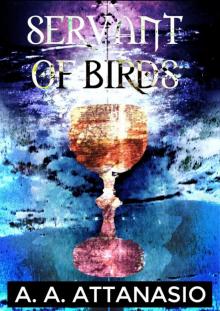 Servant of Birds
Servant of Birds The Eagle and the Sword (The Perilous Order of Camelot Book 2)
The Eagle and the Sword (The Perilous Order of Camelot Book 2)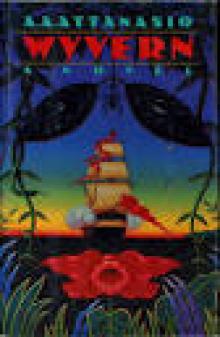 Wyvern
Wyvern The Last Legends of Earth
The Last Legends of Earth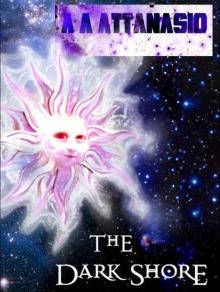 The Dark Shore (The Dominions of Irth Book 1)
The Dark Shore (The Dominions of Irth Book 1)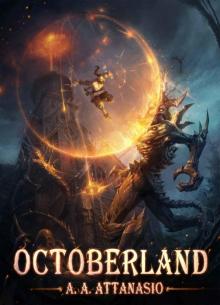 Octoberland (The Dominions of Irth Book 3)
Octoberland (The Dominions of Irth Book 3) Arc of the Dream
Arc of the Dream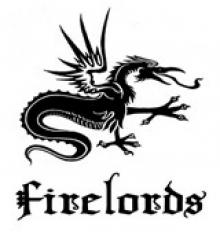 p1b6fn7sdh1ln0g4v1pkvkuqim54
p1b6fn7sdh1ln0g4v1pkvkuqim54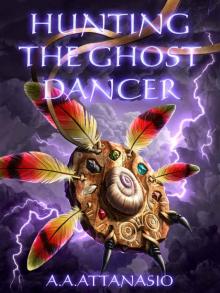 Hunting the Ghost Dancer
Hunting the Ghost Dancer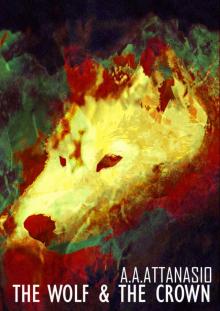 The Wolf and the Crown (The Perilous Order of Camelot Book 3)
The Wolf and the Crown (The Perilous Order of Camelot Book 3)